- Home
- Iain Pears
The Bernini Bust Page 9
The Bernini Bust Read online
Page 9
'Safest drivers in the world, we Californians.'
'Tell that to the driver of the purple truck that nearly took my kneecaps off.'
Moresby looked sympathetic.
'Of course, it might have been my fault,' Argyll said, determined to be fair. 'Partly, at least.'
'Don't say that,' Moresby advised. 'Never admit fault. Then you can sue the driver if you find him.'
'I don't want to sue him.'
'But if he finds you, he might sue you.'
'What on earth for?'
'Emotional distress caused by the closeness of damage to his fender. Sort of things courts take seriously out here.'
Only just convinced that Moresby was joking, Argyll took his leave, first asking for directions back to his hotel. His sense of direction was such that he could well have landed in the Rockies without guidance at every turn. Right, right and left at the bar, Moresby said. Then follow your nose. Yes, it does serve food. Argyll didn't want any, really, but thought it would be a good place to stop, so he could get more directions and soak up the whisky. Just in case.
He did. Ate a vegetarian hamburger of mind-boggling awfulness, drank a cup of coffee so weak you could see through it, and proceeded to round off a perfect day in a hospital bed with a broken leg.
It was perfectly simple. He drove all the way back to the hotel without making a single wrong turn, had a shower and then headed up the freeway to pay his respects to Mrs. Moresby. No mishaps or problems whatsoever. Except that, technically speaking, he didn't need to take a freeway at all, but got wedged in an entry lane and had no choice. Even, miracle of miracles got the right exit. Well, more or less. Down the ramp to the lights and right turn at the end, put on the brakes to slow down in the officially approved manner, and nothing happened.
Or rather, everything did. His vast and unwieldy Cadillac sailed majestically through the red lights, narrowly missing an assortment of cars, buses and trucks coming across at him. Mounted the sidewalk, still travelling at a decorous twenty-five miles an hour and scarcely jolted by the bump due to the formidable suspension, then proceeded inexorably through a twenty-foot-square plate glass window of, as Morelli mentioned, a designer clothes store, causing considerable damage to their stock.
Fortunately it was a very expensive shop, catering only to the seriously wealthy and, at the time of his entry, had no customers whatever. Indeed, there had been no customers at all so far that day. Business was so bad that the one saleswoman felt it perfectly safe to go out the back for a few moments for a quick smoke. Regulations forbade her to smoke inside the building and neither the owner nor the few customers approved.
It was just as well that she did, as when she returned the shop was not in the tidy condition in which she had left it. Argyll's left leg was jammed hard down on the brake pedal, even though the mechanism refused absolutely to respond. And, in a habit picked up from too much time in Rome, he indicated his pique at developments to curious spectators by throwing both hands above his head in the archetypal Italian gesture that indicates a cosmic despair at the bizarre absurdity and unfairness of life.
And he was in this posture when the front end of the car, fortunately several yards ahead of him, hit a brick wall in the centre of the building. Argyll was pushed forward, but his left leg, wedged against the brake pedal, tried to keep his body in place and gave way under the strain. A sizeable portion of the rest of him crashed against the steering wheel, unrestrained as it was by his hands which had still not completed their gesture, and broken glass coming in the other direction completed the damage.
Damn it, he thought as he lost consciousness. I'll never be able to criticise Flavia's driving again.
Chapter Six
Flavia arrived at the office at ten in the morning, feeling very much the worse for wear. She had, after all, been up until the early hours chasing phantom art dealers, and had spent what little remained of the night in bed, strangely disturbed about Argyll's likely condition. An expensive phone call to the hospital yielded only platitudes and a point-blank refusal to let her talk to him. He was as fine as could be expected and asleep; and anyway, who was she?
A friend, she said. If there was any change in his condition would they call immediately. They said they were not authorised to make overseas calls. So call Detective Morelli, then. This they agreed to do.
It was mere habit that brought her into the office, combined with the simple realisation that there was not much else to do. She was summoned immediately to Bottando's office when she arrived.
'Good God, you look awful,' he said as she staggered in. 'Anyone would think you'd been up all night.'
She tried, but failed, to stifle a yawn and did her best to focus on him properly. 'I suppose you want to hear about di Souza,' she said. 'He wasn't on the plane.'
'I know,' he replied. 'I've been having another long chat with that Morelli. He's launched a request - official this time - for our help.'
'If his murderer's not here, I don't see what we can do. What sort of help?'
'This bust. May have come from here, probably smuggled, certainly stolen from a packing case next to the body. Perhaps a connection. They want to know what it is. So do I. As you've looked into this already, I thought you'd better continue with it. If you're up to it.'
She was halfway to protesting that she'd wasted enough time on this already, but Bottando's implied reference to female frailty swung her decision the other way. Of course she was up to it. Just a little woozy, that was all.
Bottando, of course, who'd known her for several years now, had seen certain that the comment was just the deft little touch that was required. For himself, he was largely of the opinion that the matter could wait, certainly until the Americans actually recovered the thing, and they could find out whether it was worth trying to get back.
But international co-operation was always prestigious, and he was quite pleased that his department was getting involved rather than tie carabinieri. It looked good on the annual report, that sort of thing, and his fiefdom was small enough and vulnerable enough not d be able to turn its nose up at high-profile activities, no matter how utile they were likely to prove.
On top of that, of course, Morelli had mentioned that Argyll had suggested the contact, so he owed him one. Putting Flavia on to it, Le reckoned, paid the debt promptly and generously. Judging by what Morelli had said - the Englishman with a broken leg and liable to be sued for enough money to restock an entire shop full of French lingerie, quite apart from hospital bills - he needed all the help he could get at the moment.
'So,' she said, yawning again and overcoming a reluctance to get involved in anything concerning Argyll, sorry for him though she felt, 'what do you want me to do?'
'First,' he said, listing the points on the fingers of a pudgy little hand, 'Go out, and buy yourself several of the strongest coffees you an lay your hands on. Second, drink them. Third, get the paper -Herald Tribune would be the best - and see what it says about this whole business. Then see what you can find out about this bust, finally, go and see the man who bought it. Man called Langton, apparently. He lives in Rome, and is flying back today.'
'He bought Argyll's Titian,' she said absentmindedly.
'Hmm. Find out where he got the Bernini from, how much he aid for it, how it left the country, what di Souza's gripe was. You'd better dig out di Souza's file as well. There must be one somewhere round here. I really must get our filing system sorted out. Go and see his friends, search his apartment. Usual stuff.'
'And then?'
'Then,' he said, smiling slightly as he noticed that she was beginning to revive a little. Got her, he thought. Stage one complete,
'Then you can stop for lunch.'
Of course, it took longer than that; drinking coffee and reading newspapers can't be hurried. A couple of hours later, Flavia had learnt what there was to know about the case from the fulsome reports in the papers, drunk the better part of a litre of coffee and then decided to go straight into lunch
to consider matters.
She was feeling very much better. For all her reluctance, the case had tickled her fancy a little, and Argyll's mishap had done something to soften her hostile thoughts. He was still an idiot, of course, but he was manifestly a bigger danger to himself than he was to anyone else.
As for the case itself, she could not see any clear explanation for what had happened. This was not surprising - if it had been obvious to her then undoubtedly the Los Angeles police would have leapt to the same conclusion. However, it seemed that Moresby and di Souza had gone to the office to discuss the Spaniard's gripe about this bust; and that it must have been fairly important for a man like Moresby to interrupt his evening to talk to a mere art dealer.
Now, if you are going to talk about something, it helps to see it. So, it was reasonable to suppose that the first thing they did was peer inside the case containing the bust. Moresby then summoned his lawyer or aide or whatever he was, and moments later he was shot and di Souza legged it.
As far as she was concerned, this indicated that the bust was pretty central to proceedings.
She finally located the office record on Hector di Souza - filed under 'H' for some reason - and read it carefully. A bit of a lad, our Hector, she thought. Even though the file was thin - the department had only existed for a few years and early material had been begged, borrowed or stolen from somewhat inadequate carabinieri archives -it was clear that di Souza was one of that breed who couldn't help pulling a fast one on gullible clients. He'd been in operation since about 1948, when he'd been washed up in Rome after the war. A lot of people got into the art business then, in a period when tens of thousands of works of art were drifting around the continent, their owners dead, or lost or forgotten. A lot of money to be made if you knew what you were doing and didn't mind cutting a few corners.
Di Souza was a master corner-cutter. For some reason he had never been prosecuted for anything, but he had sold some dodgy stuff, and almost certainly fobbed newly made fakes on to the unsuspecting for high prices. There was, in fact, the name of a sculptor in Gubbio who had worked for him occasionally. Many years ago, certainly, but old habits . . .
She noted that down thoughtfully. Pity the information was so scanty. Of course, if you open a box and find you have paid four million dollars for a fake, you might get annoyed. Demand your money back.
James Langton, the Moresby agent in Rome who had assiduously plundered the galleries and collections of the country for the past few years to stock the museum, was clearly the place to start. Flavia checked her watch, and reckoned that he should have got back by now. Then she picked up a phone book, found the address and summoned a taxi.
Langton, however, was hard to get hold of; he had gone straight to bed and was evidently reluctant to get out of it again. She had to lean on his doorbell before he appeared, frowsy, ill-humoured and very much the worse for wear. That was his problem; she had a job to do. So she pestered him with officialese until he agreed to get dressed, and then took pity on him and steered him off to get some coffee in him. The fresh air seemed to do something to wake him up.
'Terrible thing, terrible,' he said as they walked across to a small piazza that contained a dingy bar. 'I'd known old Moresby for years. Imagine, being killed like that. Have you heard anything new? Have they arrested di Souza yet?'
Flavia said they hadn't, and asked why he thought they would. Couldn't see who else might have done it, he said.
Langton broke off to order a coffee. Decaffeinated, he insisted. Caffeine made his heart race. 'Bit outside your area of operations, isn't it?' he said. 'I thought you dealt with art thefts?'
'We do. There's been one. Your Bernini,' she went on. 'Quite apart from the fact that it was material to the murder, we have reason to believe it may have left this country illegally. If so, we'll want it back. You know the laws about exporting works of art as well as I do, I'm sure.'
'So what do you want to know?'
'First routine details, if you don't mind. I'll read, stop me if I go wrong. James Robert Langton, nationality British, born 1941, educated London University, worked as a dealer until employed by Arthur Moresby in 1972. OK so far?'
He nodded.
'Curator of Moresby collection in Los Angeles until three years ago, then chief buyer in Europe based in Rome.'
He nodded again.
'A few weeks ago you bought a bust said to be by Bernini . . .'
'It was.'
'Said to be of Pius V.'
'It is.'
'Where did you get it from? What was it like?'
'It was perfect,' he said. 'Undoubtedly genuine. Excellent condition. I can let you have my written assessment, if you want.'
'Thank you. I'd like to see it. Where did it come from?'
'Well, now,' he said. 'That's a bit tricky.'
'Why's that?'
Langton adopted the look of someone whose sense of professional propriety was coming under strain. 'Confidential,' he said at last. She waited for him to go on. 'The owners were most insistent. Family matter, I gather.'
Flavia assured him that, while she was ordinarily very aware of the difficulties of families, she wanted to know where that bust came from. Discretion assured. He still didn't seem convinced, so she also told him that, in order to continue his career in Italy, he'd need to get his residence permit renewed in a few months. And smiled sweetly in the way you do when you have the power to make the Interior Ministry get awkward. Not that she had, and anyway it didn't seem to have much effect. He said he anticipated leaving the country to go and live in America again soon. Having him deported wasn't much of a threat. So she tried the all-buddies-in-this-together approach.
'Listen, Mr. Langton,' she said in her kindest of voices, 'You know as well as I do that an unknown seller is the oldest trick in the book for covering up smuggled goods. Unless you want us to go all the way back until we get to the marble dust underneath Bernini's fingernails, you'd better tell us where that thing came from. Because we'll be after you until we get it back.'
Oddly enough, it didn't work. What more could she possibly do?
All he did was smile at her and shake his head slowly. It seemed that the more she pushed, the more relaxed he got. Strange.
'I can't stop you investigating,' he said smugly. 'But I'm absolutely certain you won't find anything at all to incriminate me. I bought it fairly, and the museum paid for it when it arrived in America. As far as smuggling goes - well, you're right, it was. No harm in admitting that. Di Souza took it out of the country, and the previous possessors owned it until it arrived at the museum. Di Souza and they bear the responsibility, not me. That's why I'm not going to tell you who they are. And, frankly, there's not much you can do about it now.'
The statement made Flavia twitch with anger. Because Langton was essentially correct. The most they could do was fine the owner for smuggling - if they ever worked out who it was – and perhaps di Souza for complicity, if he also turned up. As the bust was not paid for until it arrived in America, it remained the old owner's property until then. The museum had done nothing at all that was actionable. It was enough to make her hope they didn't recover it.
'You will at least confirm that Hector transported it?'
This Langton was happy to do.
'But he didn't know what it was. You can't blame him.'
'A contract's a contract,' he said. 'Besides, you don't really believe that Hector was such an innocent, do you?'
Flavia drummed her fingers on the table with frustration and tried one last time. 'Look,' she said. 'You know very well we're not interested in you, or in this family, or in prosecuting anyone. We want that bust back, but more importantly we're trying to help the Los Angeles police sort out Moresby's murder. Your employer, after all. His death had something to do with that bust. So why don't you just tell us where you got it from?'
Langton shook his head slowly. 'Sorry,' he said, again with the slight glimmering of a smile on his face. 'Can't. And you're wasting
your time pressing me.'
'You're not being very helpful, you know.'
'Why should I be helpful? If I thought incriminating this family might be of use I would be bending over backwards to help. But there's nothing I can do or say. That's why I'm back here. The police there didn't want me for anything. I told them I'd bought the bust, that di Souza had transported it, I'd been at the party and hadn't seen anything unusual. They confirmed from the video cameras that I was sitting on a lump of marble smoking a cigarette at the critical moment so couldn't have killed anyone. That's all I have to tell you as well. Telling you where the bust came from is entirely irrelevant and would achieve nothing but compromise my reputation for integrity.'
'You have one?'
He smirked at her. 'I do. And I intend to keep it. So mind your own business.'

 The Dream of Scipio
The Dream of Scipio Stone's Fall
Stone's Fall The Last Judgement
The Last Judgement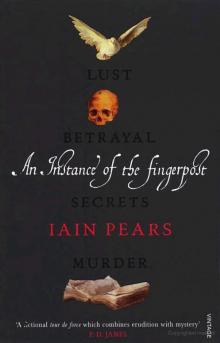 An Instance of the Fingerpost
An Instance of the Fingerpost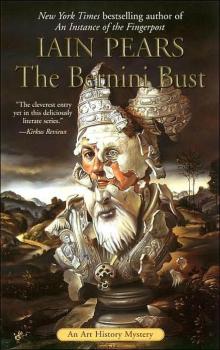 The Bernini Bust
The Bernini Bust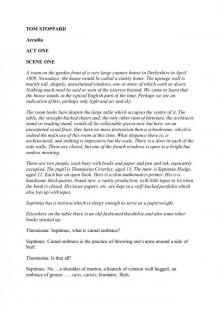 Arcadia
Arcadia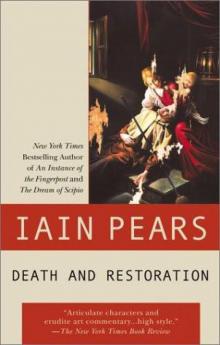 Death and Restoration
Death and Restoration The Raphael Affair
The Raphael Affair The Titian Committee
The Titian Committee The Immaculate Deception
The Immaculate Deception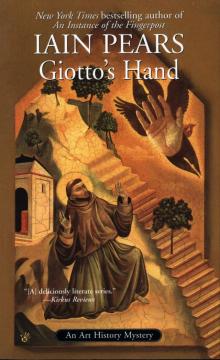 Giotto's hand
Giotto's hand The Portrait
The Portrait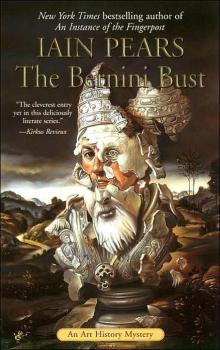 The Bernini Bust ja-3
The Bernini Bust ja-3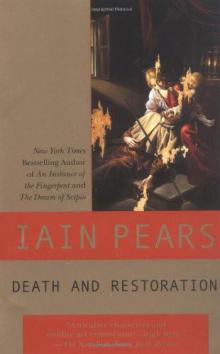 Death & Restoration ja-6
Death & Restoration ja-6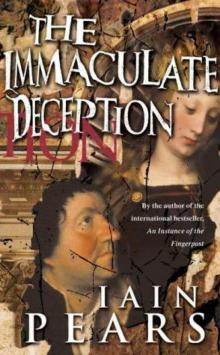 The Immaculate Deception ja-7
The Immaculate Deception ja-7